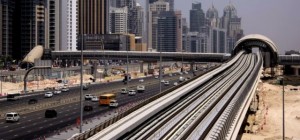Source: www.zawya.com
The GCC countries are witnessing a noticeable movement to activate the development of infrastructure projects, with a particular focus on the development of transport projects, mainly the metro and railways which are aimed at paving the way for the Pan GCC Train which will help achieve more integration in the light of the current economic growth, the global economic developments and the trends towards the creation of more major economic blocs.
 GCC economic and financial experts think that the project is in need of an added point that is critical to achieving the requirements of the successful and healthy development. This is to accelerate the implementation of the GCC Customs Union (GCC-CU), similar to the open skies policy applied in aviation sector, and to speed up the completion of the list of commodities allowed to transit the GCC countries in order to avoid any delay in the movement of the train. There are still some goods allowed to transit through some GCC countries and restricted in others.
GCC economic and financial experts think that the project is in need of an added point that is critical to achieving the requirements of the successful and healthy development. This is to accelerate the implementation of the GCC Customs Union (GCC-CU), similar to the open skies policy applied in aviation sector, and to speed up the completion of the list of commodities allowed to transit the GCC countries in order to avoid any delay in the movement of the train. There are still some goods allowed to transit through some GCC countries and restricted in others.
Observers believe that the success of train projects in the GCC countries, in general, and the KSA, in particular, is dependent upon two directions. First is to enhance public – private partnership (PPP) to jointly develop and operate the train. Second is to take care of the transport tariff through ideal coordination between government and investor. Train transport tariff must be cheaper than road and air transport and more expensive than sea transport. On the other hand, train transport must be slower than air transport, equal to the speed of road transport and faster than sea transport.
Mr. Omar Al Juraifani, Economic and Financial Analyst, said: “Train transport has several significant benefits, including reducing energy consumption and reducing traffic accidents, both serve the interest of the national economy on the long term basis. In order to activate public – private partnership, it is important to divide these projects into two parts: first: the infrastructure development of the project- be it railway project or others- will be carried out by the private sector. The operator, the private sector or the government, will lease the line, in order to reduce spending budgets allocated for these projects and guarantee fast delivery and high quality”.
Al Juraifani added: “The second part, the operator of the railway, can be given to private sector. Government grants operating license, such as aviation license to the private sector. The government guarantees a certain level of the income to the operator, based on accurate studies, thus the government benefit from the private sector. The rail projects are low return and low risk projects. Retirement funds can be targeted to invest in such projects to generate guaranteed revenues”.
The need to accelerate the completion of the Pan Gulf Train can be partially attributed to the current high shipment costs which burden the budgets of a lot of development projects in the GCC countries. When there is a container, for example, needed to be transported from Dubai to Dammam, Eastern the Kingdom Saudi Arabia, then the cost will be $500 via sea shipping line, and will be delivered within 4-5 days. The cost will rise to $1500 when it is transported through road, and will be delivered within 2-3 days. Air cargo will cost doubles. The time is estimated without calculating the customs clearance period for all types of shipment. Railway shipment will save time, money and energy.
In order to be sure that the benefits from such multibillion giant projects will meet the ambitions, the relatively low wages of drivers must be reviewed. The average salary of a driver in the KSA is SR3000 ($800) for over 10 working hours per day. This is negatively reflected on his performance. The streets of the KSA are seeing tragic truck accidents, while such types of accidents are rare in Europe, for example.
Strict laws are in place in Europe, applied for all with no exception. The salary of a driver in Europe is $2600 (SR10.000), for 8 working hours per day. All trucks are monitored by GPS. We can employ Saudi nationals with the same rate of salary to get the same results.
















